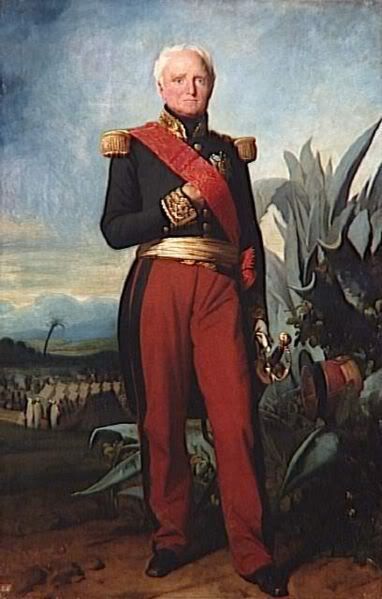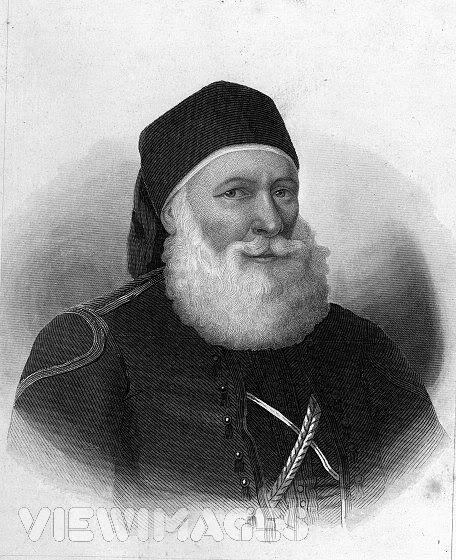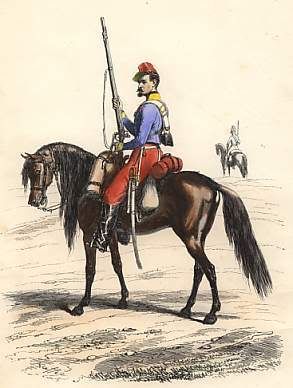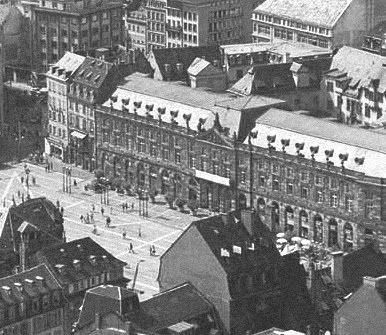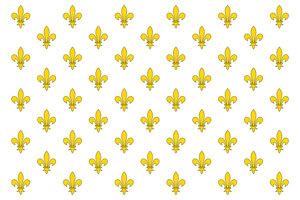Chapter VI: Downfall
This stagnancy continued for 3 years. 3 years of political humiliation for France, Switzerland's Sonderbund Rebellion ended with France backing down, Tahiti ended with France backing down, France was humiliated, the joke of the world. The Republicans reacted, and Louis-Philippe was toppled.
The situation in this republic was not much better, and this crippled government was toppled just weeks ago. Which brings us to the present. Legitimists have seized France, tore down the treacherous tricolor, and hoisted makeshift white and gold flags throughout Paris and Henry d'Chombard has been crowned Henry the 5th, King of the French. Riots have broken out in Grenoble, Pau, Paris and Charleville, with smaller ones throughout. The military remains loyal for now, and has been actively battling the rioting Republicans, Bonapartists, and Orleanists. Many however, have rallied at Henry's promise to reclaim French glory.
The flag of the reactionist revolutionaries
In his first act as king, Henry had issued that all taxes are to be set to 20% to alleviate the suffering of the people under the Orleanists and the Republicans. He then wrote a letter to the soldiers of Algeria, which was posted throughout the colony.
Soldiers of Algeria,
There are certain grievances that a government can commit that are inexcusable. One that I, the new and rightful King of France consider most offensive is the betrayal of it's soldiers. Know that I shall work tirelessly in your name to restore the Kingdom of France, and I wish nothing more than to have your approval in this great fight.
Recall your brothers who have died fighting all around the world for our great homeland, and the respect you surely have for them, for that is what I have for you. I will serve you, as I hope you will continue to serve me. I am reorganizing Algiers to alleviate some pressure put upon you lads.
I understand there are back pay issues in regards to your situation. I will have you know I am sending you double your salary for the mistakes of the Republicans and Orleanists.
Henry V
The situation in Algeria under Henry V is improving greatly. Like promised in his letter, Algeria is reorganized, and Abd al-Qadir at last has surrendered and is being sent into exile in Syria. Things in Algeria are looking very good
The riots at home continued endlessly. The Royal Guard maintained a solid grip on Paris and Versailles, but the metro areas of Paris were fully succumbed by riots. The royal army was sent out to cleanse the areas of the rioters, and had a great deal of success in Chartres. It seems as though while Conservatives had been relatively neutral on the issue, Liberals are furious at the arrival of the great king. They soon found France would crush them just as the Habsburg and truly all monarchies around Europe did.
Thousands left for the United States, particularly our former colony of Louisiana. Every week there's a new riot or rebellion, we can hardly keep up, yet somehow the military remains in good spirits, as do many of the conservatives throughout France, in hopes of the bright future the liberals seek so hard to sabotage!
As June rolled around, the drive of many taking part in the so called "Liberal Revolution" was gone. Thousands of French liberal thinkers were killed in their destructive riots, leaving the rest demoralized, and ready to return to their jobs and fight for France, not against it.
Henry's first task was to reverse the embarrassment that the Legitimists suffered against the Carlists in Spain. 32 reserve divisions were mobilized for a war against the Isabelists. War was declared May 16th, 1851. The French order of battle was as follows:
Franco-Spanish War May 16th, 1851-May 18th, 1852
Divisions participating in the invasion of Spain:
Total: 354,000 men on the Pyrenees border, 150000 in reserve, 80000 in Algeria
Royal Corps (King Henry V and General Archand)
30000 Infantry divided into 3 divisions
12000 Royal Guard Infantry (Elites)
12000 Royal Guard Cavalry
Northen Corps (2 detachments)
50000 Infantry commanded by General Louis
50000 Infantry commanded by General Vasser
Central Corps (2 detachments)
50000 Infantry commanded by General Merle
50000 Infantry commanded by General Regnaud
Southern Corps (2 detachments)
50000 Infantry commanded by General Faucet
50000 Infantry commanded by General Beauvais
Franco-Spanish War: August 1851
Within two months the French forces captured the majority of the former Carlist strong holds, to much adulation. Spanish volunteer armies began assembling to fight alongside their French comrades, as they advanced further still to Madrid. The advancement was indeed so fast, 20000 Spanish soldiers surrendered in Tortuga when they found their communication lines broken, as the French forces seized Morella.
Latter stages of the Battle of Valencia
As France steadily moved closer to Madrid, Isabella become aware her reign as queen may be coming to an end, and quickly offered the French all of Castille in exchange for the end of the war. Henry flatly rejected, and the peace talks fell through, and the French advance continued, and the first major engagement of the war took place in Valencia.
There, 150000 French and Carlist soldiers battled against 50000 well entrenched Spanish soldiers. But the numbers were unfortunately for Spain, far to great to overcome, and 16,000 Spaniards lost their lives fighting, while 5,000 Frenchmen fell. Valencia was taken days later in light combat.
On the verge of taking Madrid: April 1852
By May the French had proven themselves triumphant in Spain, and Charles V was crowned in Madrid 5 hours after Isabel's surrender. Around 45,000 French soldiers had fallen in combat, while 115,000 loyalist forces fell for Spain. Also present was Miguel of Portugal, former King of Portugal. He was assured by his Uncle King Charles V and King Henry V that they would do all in their power to restore his throne very soon.






